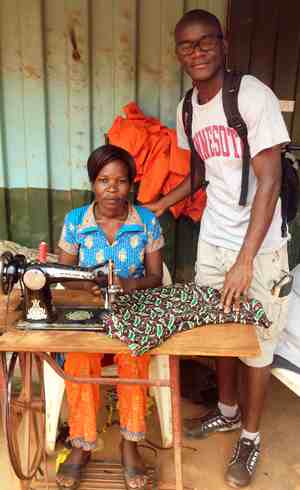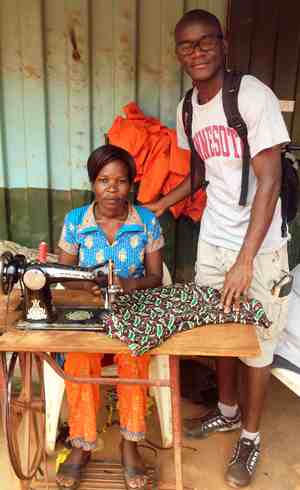 KINGSTON, R.I. – Oct. 9, 2013 – Komlan Soe grew up in squalid refugee camps in Africa – an experience that would keep most away from the continent forever. But Soe went back not long ago to help people in dire need: poor Ugandan women trying to start small businesses.
KINGSTON, R.I. – Oct. 9, 2013 – Komlan Soe grew up in squalid refugee camps in Africa – an experience that would keep most away from the continent forever. But Soe went back not long ago to help people in dire need: poor Ugandan women trying to start small businesses.
Soe, who graduated from the University of Rhode Island in May with a bachelor’s in political science and sociology, says the goal of the program is to make women economically independent so they can lift themselves out of poverty.
“Women don’t just need handouts,” says Soe, 27, of Narragansett. “They need knowledge about how to start and run businesses so they’re successful. They need guidance to help themselves and their children.”
The Community Transforming Network, a Uganda-based nonprofit organization founded in 2007 by the activist, Godwin Muhanguzi, sponsored the trip, from June through August. Soe paid for his own plane ticket; the group covered his living costs.
Soe traveled to rural villages helping women improve the small businesses the nonprofit had helped start years earlier. He taught them how to balance their books, reinvest any profits, and diversify their businesses, ranging from raising goats and owning a food store to running a restaurant and making clothes on a sewing machine.
Soe says it’s crucial to help women in Uganda, one of the poorest nations in the world, with 38 percent of the population living on less than $1.25 a day. Northern Uganda has been ravaged by civil unrest since the 1980s, leaving thousands dead – mostly men. Women must fend for themselves.
“I want to bring a different perspective about Africa to the world,” says Soe. “The image on TV is a continent with starving children and people living in trees. I want to show the other side of Africa. I want people to know that Africa is a continent to partner with and that if you work with Africans we can all solve these issues of poverty, hunger, and disease.”
Soe’s life is about forgiveness and giving back. Born in Liberia, he spent his first three years on earth in the Western African country, living on a farm with his parents and nine siblings. That idyllic life came to an end when a bloody civil war broke out in the early 1990s, forcing the family to flee to a refugee camp in the Ivory Coast.
It would be his home for the next decade. At first, he lived in a tent, then a shack. Drinking water was scarce. He ate rice and canned sardines. Sanitation was awful. There were no school buildings; he and other youngsters gathered under the shade of an acacia tree to learn their multiplication tables.
He had no shoes. “Honestly, as a kid, you think it’s a normal life,” he says. “I didn’t know any other way. As I grew up I started being sensitive about my environment: Why am I here?”
When civil war erupted in the Ivory Coast in 2002, Soe and his family packed up and moved again, this time to a refugee camp in Ghana. Soe was 15. He was smart and curious. He’d stop by a United Nations office at the camp and read anything he could get his hands on: newspapers, magazines, press releases pinned to the bulletin board.
A friendly UN worker took note and started bringing Soe books to read: African literature, novels, and nonfiction about political theory. The worker encouraged Soe to take an entrance exam at a prestigious boarding school outside Accra, Ghana’s capital. Soe got the highest score among the 50 applicants and won a four-year scholarship.
“Transitioning from sitting under a tree to sitting at a comfortable desk was hard for me,” he says. “I was a boy who wrote on pieces of wood and now I’m sitting in a class with rich kids wearing a uniform.”
To compensate for those lost years in the classroom, he studied every night at the school library until closing time. His confidence grew, as well as his passion for global politics. He needed to understand why he was a man without a country and why his beloved Africa was imploding.
After graduating from high school in 2005, he went to Providence, where he joined his father, who came to Rhode Island in 1999, along with thousands of other Liberians seeking political asylum. Soe worked for three years as an aide in a group home and then, in 2008, enrolled at the Community College of Rhode Island, where he spent four semesters. He studied during the day and worked at night and on weekends.
He transferred to URI in 2010, taking courses in political science, sociology, and history, while holding down his full-time job in the group home. One of his favorite professors was Nicolai Petro, a scholar of Russian politics and culture. “He has a great understanding of world politics,” says Soe. “He’s an amazing teacher.”
Soe is the first in his family to graduate from college. “I feel so proud,” says Soe, who graduated with honors. Anything is possible now. He is applying to graduate schools at the London School of Economics, Harvard, Columbia University, Yale, Georgetown, and Johns Hopkins. He hopes to earn a doctorate in public policy and international relations and return to Liberia some day to make the country whole again.
“It’s broken,” he says. “I can help. I can try.”
He is already trying. He started a scholarship with his own money to pay for a Liberian child to attend school. “Someone helped me get on the right path,” he says. “Now I want to save a kid’s life.”
Pictured above: Komlan Soe ’13, a graduate of the University of Rhode Island who went to Uganda this summer to help women start small businesses. Soe is from Liberia and lives in Narragansett.
Photo courtesy of Komlan Soe.

